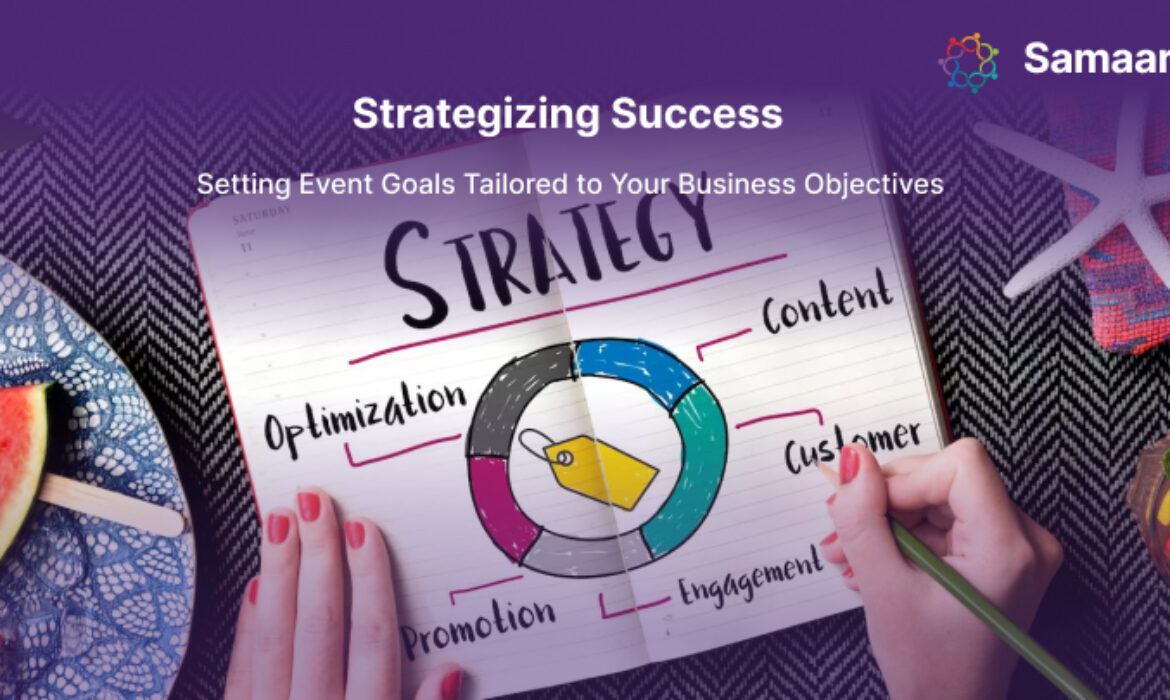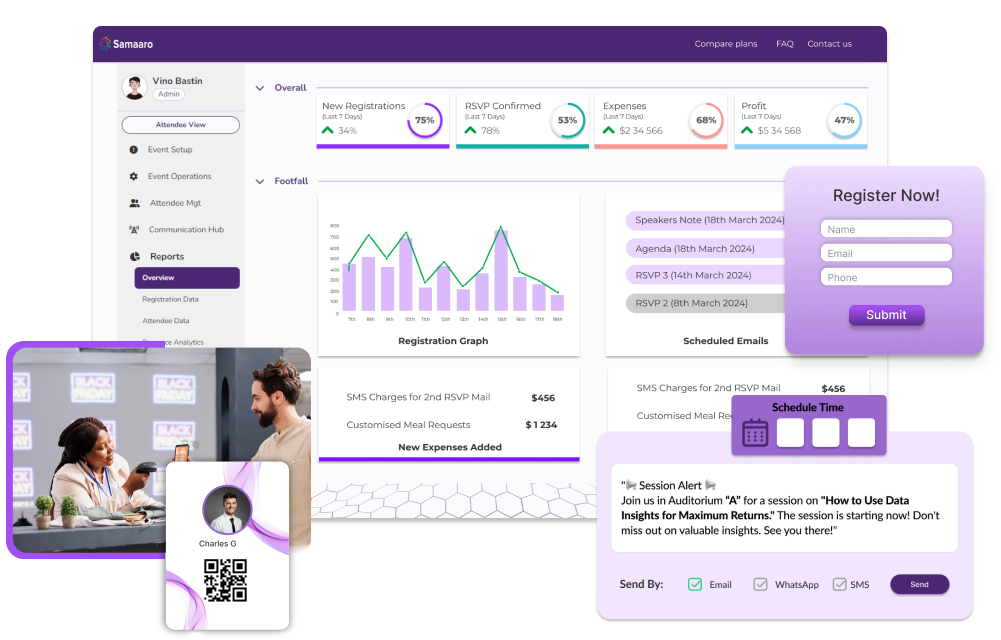We have mentioned this before, but it is important to emphasise that before you start planning your event, the first step is to clearly define your event agenda and objectives.
Defining goals for your event and outlining the necessary actions to achieve them can offer several benefits. Firstly, it helps you clearly define what success means for your team. Secondly, it allows you to anticipate any potential challenges or areas where different components of the event may align. Thirdly, it helps you understand the specific numerical targets needed for profitability or breaking even. Lastly, it enables smooth communication of your event requirements within your organisation.
To determine your event agenda, it is important to document the purpose behind your event. During the planning phase of your goals, it is beneficial to engage in a series of inquiries to improve your understanding. The questions that are included are:
- Why did your organisation decide to host this event in the first place?
- Who makes up your audience?
- What factors will motivate audience members to attend an event?
- What kind of knowledge do attendees anticipate acquiring by the end of the event?
- Which key stakeholders stand to benefit from your event?
- Which aspects of your event are significant to your stakeholders?
- How would you define a successful event?
When setting event goals, it is recommended to use the S.M.A.R.T. framework. This tool helps in creating goals that are Specific, Measurable, Achievable, Relevant, and Time Bound.
This article explores a significant set of goals that businesses should consider before organising different types of events. It emphasises the importance of having a clearly defined event agenda. It’s imperative to recognize that while events can certainly enhance brand awareness and generate leads, they should be viewed as a component within a broader marketing strategy, rather than a sole reliance.
CONFERENCES
Conference events provide valuable opportunities for the exchange of knowledge, fostering professional connections, and gaining industry insights. To optimise their effectiveness, businesses should establish the following event objectives:
- Knowledge Dissemination: Inspire participants by selecting informative sessions, workshops, and keynote addresses that disseminate important knowledge and updates about your industry.
- Networking Opportunities: Foster an environment that promotes networking, facilitating meaningful interactions among attendees, speakers, and industry experts.
- Thought Leadership: Enhance your business’s reputation as a thought leader by showcasing prominent speakers and thought-provoking content that highlights your expertise.
- Enhance Brand Visibility: Utilise the conference as an opportunity to increase the visibility of your brand. This can be achieved by prominently displaying your logo, utilising branded materials, and actively engaging in social media outreach.
- Lead Generation: Acquire contact information from individuals who have expressed interest to enhance your lead database and cultivate prospective clients.
TRADE SHOWS
Trade shows are dynamic marketplaces where businesses exhibit their products and services to a specific audience. Establishing appropriate event agenda is crucial to maximise the benefits of these dynamic occasions.
- Lead Generation and Sales: Trade shows provide an excellent opportunity to establish connections with prospective customers. Establish an objective to generate a predetermined quantity of qualified leads and facilitate on-site sales. Develop captivating exhibits, demonstrations, and interactive experiences with the aim of drawing in attendees to your booth and effectively converting them into valuable customers.
- Industry Networking: Our objective is to enhance your industry network by establishing connections with fellow exhibitors, suppliers, and influential figures within the industry. Establishing strong relationships can result in fruitful collaborations, strategic partnerships, and invaluable insights that significantly augment your business operations.
- Enhance Brand Visibility: Enhance the visibility of your brand by developing a visually appealing booth design that is in line with your brand’s identity. Our primary objective is to prioritise the development of impactful signage, branding materials, and product displays that have a lasting impact on event attendees.
- Product Launch or Showcase: Utilise the trade show as an opportunity to effectively introduce a new product or emphasise offerings, leveraging its platform to generate excitement and cultivate interest. Develop compelling product demonstrations, presentations, or exclusive previews to effectively engage the audience.
- Industry Insights/Competitive Analysis: Industry Insights and Competitive Analysis: Conduct extensive studies on trade show competitors. Collect information on their offerings, marketing strategies, and booth showcases. Utilise this information to effectively position your business, differentiating yourself and capitalising on market gaps.
PRODUCT LAUNCHES
The successful launch of a new product demands careful and detailed planning. Establishing well-defined objectives will contribute to the achievement of a prosperous launch.
- Creating Buzz and Anticipation: Foster enthusiasm and anticipation for your forthcoming product by strategically timing teasers and promotional materials.
- Media Coverage: Obtain media coverage to enhance visibility and expand the reach of your product, thereby enhancing its market entry.
- Targeted Audience Engagement: The objective is to identify and extend invitations to key stakeholders, influencers, and potential customers to facilitate focused and meaningful engagement.
- Product Awareness: Inform participants about the various features, advantages, and distinctive selling points of your recently launched product through captivating presentations and interactive demonstrations.
- Sales and Conversion: Offer attendees the chance to have a firsthand experience with the product and facilitate on-site sales or pre-orders.
POP-UP EVENTS
Pop-up events are transient experiences that offer a one-of-a-kind opportunity to interact with a specific audience in a unique location. When organising a pop-up event, consider the following agendas:
- Limited Time Offers: Create a sense of urgency by offering limited-time promotions, discounts, or products that are only available during the pop-up event. This objective can fuel sales and generate enthusiasm among attendees.
- Customer Engagement: Create experiences that are memorable and shareable and resonate with attendees. Include interactive elements, photo opportunities, and immersive environments to entice attendees to interact with your brand.
- Data Collection: Set a goal to collect customer data, such as email addresses and social media interactions, to develop a stronger relationship with event attendees after the event.
- Test & Learn: Utilise pop-up events as proving grounds for new products, ideas, and marketing strategies. Collect participant feedback to inform future business decisions.
SEMINARS
Seminars are educational activities designed to facilitate the exchange of knowledge, expertise, and insights. When organising seminars, keep in mind the following objectives:
- Educational Value: Develop a seminar schedule that addresses the requirements and interests of your intended audience. Set a goal to provide attendees with actionable takeaways and insights they can implement to their businesses or personal lives.
- Thought Leadership: Establish your company as an industry thought leader by curating a roster of knowledgeable speakers and expert panellists. This objective can increase your credibility and reputation in your field.
- Opportunities for Networking: Promote networking by providing designated networking breaks, question-and-answer sessions, and interactive group activities. Encourage participants to network and share their insights and experiences.
- Audience Engagement: Develop an interactive and engaging seminar format to maintain the participation of the audience.
NETWORKING EVENTS
The purpose of networking events is to facilitate connections within an industry. Determine the following objectives for a productive networking event:
- Fostering Connections: Create an environment where attendees can develop meaningful relationships and partnerships.
- Industry Insights: Provide attendees with opportunities to gain understanding of current industry trends, challenges, and opportunities.
- Mutual Benefits: Promote collaboration and interactions that are mutually beneficial, leading to potential partnerships or business ventures.
- Brand Representation: Ensure event design, messaging, and interactions effectively communicate your brand’s values and mission.
- Relationship Nurturing: Provide means for participants to maintain post-event connections and follow-up communications.
WEBINARS
Webinars are online seminars or workshops that enable businesses to interact virtually with their audience. When planning webinars, consider the following objectives:
- Educational Content: Aim to provide your audience with informative and valuable content. Concentrate on delivering insights, tips, strategies, and industry updates that address the requirements and interests of your target audience.
- Thought leadership: Establish your industry authority and credibility by inviting expert speakers or internal thought leaders to share their knowledge. Position your organisation as a reliable source of information.
- Lead Generation: Your webinar should target a specific audience. Collect participant information, such as email addresses, for future marketing initiatives.
- Engagement and Interaction: Incorporate interactive elements, such as polls, Q&A sessions, and live conversations, into the webinar to promote engagement and meaningful interactions between the presenter and attendees.
CHARITY EVENTS
Charity events are organised to raise money, awareness, or support for a particular cause. When planning charitable events, consider the following objectives:
- Fundraising: Set a specific fundraising goal and create strategies to encourage attendees, sponsors, and supporters to donate. Create engaging donation platforms and giving opportunities for your visitors.
- Awareness: Inform participants about the cause you’re supporting and the impact their contributions will have. Utilise narratives, visuals, and compelling stories to convey the significance of the cause.
- Community Engagement: Strive to emotionally engage and personally connect attendees with the cause. Provide opportunities for attendees to interact with beneficiaries and hear from those whose lives have been affected by the cause.
- Partner Collaboration: To amplify the impact of your event, collaborate with local businesses, influencers, and organisations aligned with the cause. Establishing effective partnerships that benefit both parties and the cause should be your objective.
PARTNER MEETS
Partner meetings bring together business partners, distributors, resellers, and other stakeholders to strengthen relationships and discuss potential collaborations. When organising partner meetings, consider the following objectives:
- Relationship Building: Establish the objective of fostering stronger relationships with partners and collaborators. Provide opportunities for informal interactions and networking.
- Opportunities for Collaboration: Identify prospective areas of partnership collaboration or joint ventures. Establish the objective of initiating discussions and agreements that can lead to initiatives that are mutually beneficial.
- Product or Services Update: Utilise the partner meeting to provide updates on new products, services, and business strategies. Establish a target to ensure that your partners are well-informed and outfitted to promote your products.
- Feedback: Collect feedback from partners regarding their experiences collaborating with your organisation. Establish a goal to identify areas for improvement and address any partner concerns.
Setting definite, detailed event goals/agenda is comparable to plotting a successful journey. These objectives act as compass points, pointing your efforts, resources, and innovation in the direction of obtaining worthwhile results. However, it’s especially important to stress the significance of not combining goals and anticipating various results from the same occurrence. Each objective has a unique focus and purpose, and attempting to combine or compel them can result in confusion, ineffective efforts, and ultimately unsatisfying outcomes.
.










